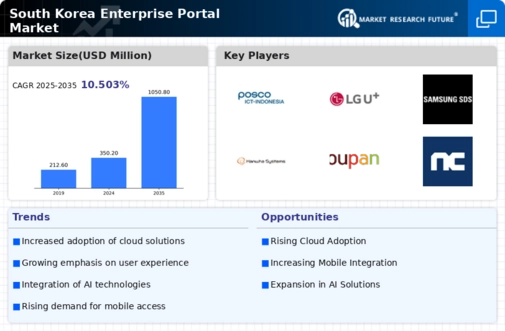Increased Focus on Data Security
In the context of the enterprise portal market, the heightened emphasis on data security is a critical driver influencing adoption rates in South Korea. With the rise in cyber threats and data breaches, organizations are prioritizing the protection of sensitive information. Recent statistics reveal that over 60% of South Korean companies consider data security a top concern when selecting enterprise portal solutions. This focus on security is prompting vendors to enhance their offerings with robust security features, such as encryption and multi-factor authentication. Consequently, the enterprise portal market is evolving to meet these security demands, ensuring that organizations can safely leverage digital platforms for collaboration and information sharing without compromising data integrity.
Regulatory Compliance and Standards
The enterprise portal market in South Korea is also influenced by the need for regulatory compliance and adherence to industry standards. Organizations are required to comply with various regulations, including data protection laws and industry-specific guidelines. This necessity drives the demand for enterprise portal solutions that facilitate compliance management and reporting. Recent data indicates that nearly 65% of South Korean enterprises prioritize compliance features when selecting enterprise portal software. As regulatory landscapes continue to evolve, the enterprise portal market is expected to adapt, with vendors enhancing their offerings to include compliance-related functionalities. This focus on regulatory adherence not only mitigates risks for organizations but also positions enterprise portals as essential tools for maintaining operational integrity.
Growing Adoption of Mobile Solutions
The enterprise portal market in South Korea is significantly impacted by the growing adoption of mobile solutions. As mobile technology continues to advance, organizations are increasingly seeking ways to enable access to enterprise portals via mobile devices. This trend is particularly relevant in a country where mobile penetration rates exceed 95%. Enterprises are recognizing the importance of providing employees with the flexibility to access critical information and collaborate on-the-go. Consequently, the enterprise portal market is likely to expand as vendors develop mobile-friendly solutions that cater to this demand. The integration of mobile capabilities into enterprise portals not only enhances user experience but also drives productivity, making it a vital consideration for organizations aiming to optimize their operations.
Rising Demand for Digital Transformation
The enterprise portal market in South Korea experiences a notable surge in demand driven by the ongoing digital transformation initiatives across various sectors. Organizations are increasingly recognizing the necessity of integrating advanced digital solutions to enhance operational efficiency and improve customer engagement. According to recent data, approximately 70% of South Korean enterprises have initiated digital transformation projects, which often include the implementation of enterprise portals. This trend indicates a shift towards more agile and responsive business models, where enterprise portals serve as central hubs for information sharing and collaboration. As companies strive to remain competitive in a rapidly evolving market, the enterprise portal market is likely to witness sustained growth, fueled by the need for seamless integration of digital tools and platforms.
Emphasis on Collaboration and Communication Tools
The enterprise portal market is witnessing a growing emphasis on collaboration and communication tools, which are essential for fostering teamwork and enhancing productivity within organizations. In South Korea, where remote work and hybrid models are becoming more prevalent, the need for effective collaboration solutions is paramount. Recent surveys indicate that approximately 75% of South Korean employees prefer using integrated communication tools within their enterprise portals to streamline workflows. This trend suggests that organizations are increasingly investing in enterprise portal solutions that offer features such as real-time messaging, video conferencing, and document sharing. As a result, the enterprise portal market is likely to evolve, with vendors focusing on enhancing collaborative functionalities to meet the changing needs of the workforce.

















Leave a Comment